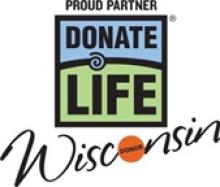Organ and Tissue Donation Program: Answers to Frequently Asked Questions
You will find the following answers to frequently asked questions about organ and tissue donation in Wisconsin.
What does it mean to register?
Registration authorizes the gift of your organs, tissues, and eyes upon your death. Your gift will be used to help others through transplantation, therapy, research, or education.
Who may register?
You can register if you are at least 15 years old and have a Wisconsin driver's license or state ID.
Where can I register?
You can register to be an organ, eye, and tissue donor at a Wisconsin DMV, by checking the "yes" box on your driver's license or State I.D. application when you obtain a new, or renew, your driver's license or State I.D. Card. You can also register by visiting the Wisconsin Donor Registry and entering your last name and driver's license or State I.D. number. Then click the green "Add my name to the Wisconsin Donor Registry" link. You can also click the "Register now" button above. Lastly, you can indicate your wish to be an organ, tissue, and eye donor when applying for a hunting, fishing, and/or trapping license through the Wisconsin Department of Natural Resources (DNR).
How can I add or remove my name from the Wisconsin Donor Registry?
You can add or remove yourself from the Wisconsin Donor Registry at any time by visiting the Wisconsin Donor Registry. You will be asked to enter your last name and Driver's License or State ID number and then you can select the "Add my name to the Wisconsin Donor Registry" or "Remove my name from the Wisconsin Donor Registry" button.
Are there age limits or health conditions that would prevent me from registering or donating?
If you're over the age of 15 and have a Wisconsin driver's license or state ID, you can register. Health conditions do not prevent you from registering. A complete medical and social history together with a number of lab tests will determine if donation is possible. There are donors in their late 70's and beyond.
What if I already have an orange dot on my license?
You are registered if you have the orange dot on your license on or after March 29, 2010.
How does my decision to become a donor help other people?
Nearly 104,000 people in the United States are waiting for organ transplants, including more than than 1,400 people from Wisconsin. Unfortunately, many are never matched with a donor. An average of 17 people die each day waiting for a transplant. Your decision to register as an organ donor could save someone's life. Additionally, tissue donations are used to treat patients who've experienced burns or serious abrasions, or those who need reconstructive surgeries. Donor tendons are used to repair torn ligaments, veins are used in surgeries, and bone is used to help heal fractures or to prevent amputation. Donor corneas can restore sight to people who are blind.
May I limit my donation?
You may amend or restrict your gift through your will, advanced directive, power of attorney for health care, or on the back of your driver's license. Let your family know about your wishes.
Where can I learn more about donation?
Visit the Organ and Tissue Donation Program and Donate Life Wisconsin to learn about organ and tissue donation in Wisconsin. You can visit The National Donor Registry Program to learn about organ and tissue donation in the United States.

